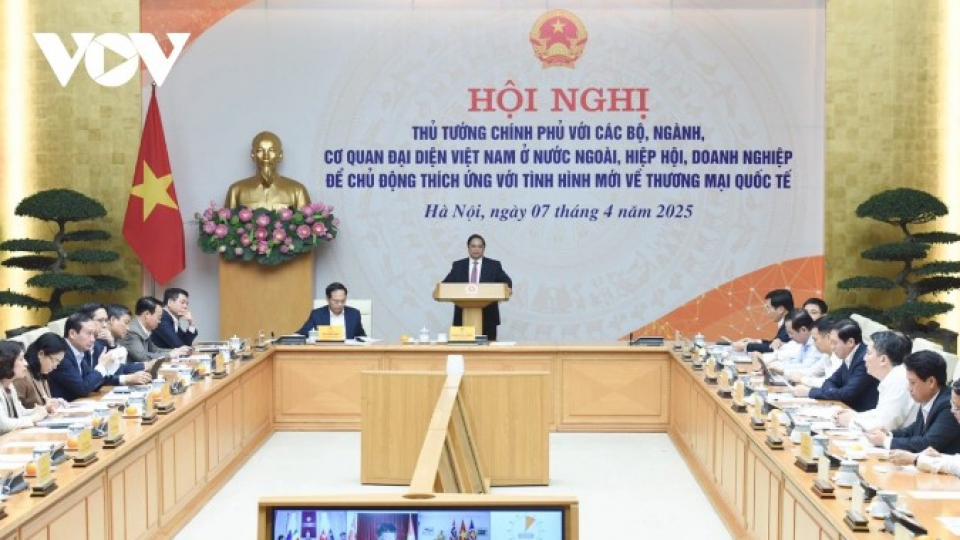Ho Chi Minh City develops growth scenarios in the wake of new US tariff
VOV.VN - Ho Chi Minh City has developed three growth scenarios after the Trump administration announced a 46% reciprocal tariff on Vietnamese commodities to be exported to the United States.
Three growth scenarios

Speaking at a seminar on April 9, Truong Minh Huy Vu, director of the Ho Chi Minh City Institute for Development Studies, revealed that in response to the new US tariff policies, the Institute has developed several economic growth scenarios for the city in the near future in case the tariff rate remains at 46%, and falls to 25% and to between 5% to 15% following ongoing negotiations.
Accordingly, if the US imposes a 46% tariff, Ho Chi Minh City’s economic growth in 2025 is expected to reach only 4.63% to 5.75%. In case the tariff is reduced to 25%, the local economy could grow by 6.23% to 7.35%, and in the most optimistic scenario, if the tariff is set at 15%, growth could reach 7.37% to 8.49%.
Previously, the city had set a target of over 10% growth for 2025.
“The scenarios are built on the assumption that Ho Chi Minh City will proactively accelerate its internal strength by boosting key economic growth drivers such as investment and consumption. Specifically, the total social investment capital is expected to reach VND620,000 billion, and the retail sales of goods and consumer service revenue are projected to grow by 13.4%. In addition, Ho Chi Minh City proposes several related solutions, such as those for import-export, addressing barriers related to imported goods, boosting domestic consumption, and attracting investment,” said Vu.
Taking the floor, Nguyen Van Duoc, chairman of the municipal administration, agreed that this high tariff would significantly impact the city and its development plans for 2025. Vietnamese goods, especially those bound for the US, will see reduced competitiveness and higher prices.
In his view, the proportion of Vietnamese exports to the US is not significant compared to the total value of the country’s exports. As a result, businesses in the export sector are calmly analysing the situation, monitoring developments, and finding appropriate solutions. Regardless of the outcome of the negotiations with the US, he said, the city will maintain its growth scenario for 2025, targeting double-digit growth, and will continue to monitor, prepare, and adopt flexible measures when the new tariff is applied.
The city is closely monitoring the operation of businesses, particularly those involved in export, to provide timely support when the new tariffs are implemented, he said, adding that it would restructure investment and trade promotion programmes, focusing on major, potential, and stable export markets.
Businesses have a say

Representatives from industries, businesses, and economic experts proposed solutions to cope with the Trump administration’s 46% tariff on Vietnamese commodities.
Nguyen Chanh Phuong, vice chairman of the Ho Chi Minh City Wood Processing and Handicrafts Association, stated that the wood industry would be significantly impacted if the US applies higher tariffs. More than 50% of the association’s members export to the US, with revenue accounting for up to 52%.
According to Phuong, Vietnamese businesses and their American partners are still discussing whether to halt orders and how to adapt to this situation. They are now relying on government negotiations, with the possibility of delaying the tariff application for 45 to 90 days to give businesses time to adjust.
Meanwhile, Pham Van Viet, vice president of the Ho Chi Minh City Association of Garments, Textiles, Embroidery and Knitting, shared that the US market is a key partner for the textile and garment industry, making up an average of 20-30% of revenue for companies in the industry.
To deal with the situation, he said, businesses could propose deferring the value-added tax (VAT) payment. In addition, businesses are expected to face challenges with cash flow in the next 3-6 months, and therefore support from banks is essential.
In the long term, he said, the government needs to develop a comprehensive strategy, creating conditions for domestic businesses to transform their supply chains and diversify their sources of raw materials. At the same time, it is necessary to support businesses in transitioning to a green development model and applying advanced technology to enhance their competitiveness.
Nguyen Ngoc Hoa, president of the Ho Chi Minh City Union of Business Association, pointed out that the 46% tariff rate will reduce the competitiveness of Ho Chi Minh City’s key export products to the US, while similar products from other competitors like China, India, and Thailand are subject to lower tariff rates of 34%, 26% and 37%, respectively.
The new tariff rate will also negatively impact the attraction of foreign direct investment (FDI) into Vietnam in general and Ho Chi Minh City in particular. The impacts of the new tariff could lead to higher export costs, prompting FDI firms to seek other countries with more stable trade relations with the US.
Other industries, such as textiles, wood products, agricultural products, seafood, electronics, and components, will also be affected, creating significant challenges for the local economy and the national economy as a whole in the context of the new US tariff policies.
Professor Tran Ngoc Anh from Indiana University (USA) suggested that Vietnam should penetrate higher market segments in the US, expand service exports, enhance the capacity of Vietnamese businesses, and accelerate the development and implementation of private economic development projects.
To achieve these objectives, he said, Vietnam needs to address bottlenecks using real-time data, build an effective and efficient management system, establish advisory groups and regular dialogues, and develop economic zones connected to Singapore, Europe, and Japan.





